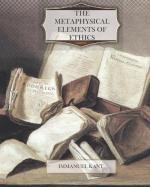{Introduction ^paragraph 180}
XV. Of the Principle on which Ethics is separated from
Jurisprudence
This separation on which the subdivision of moral philosophy in general rests, is founded on this: that the notion of freedom, which is common to both, makes it necessary to divide duties into those of external and those of internal freedom; the latter of which alone are ethical. Hence this internal freedom which is the condition of all ethical duty must be discussed as a preliminary (discursus praeliminaris), just as above the doctrine of conscience was discussed as the condition of all duty.
{Introduction ^paragraph 185}
Remarks
Of the Doctrine of Virtue on the Principle Of Internal Freedom.
Habit (habitus) is a facility of action and a subjective perfection of the elective will. But not every such facility is a free habit (habitus libertatis); for if it is custom (assuetudo), that is, a uniformity of action which, by frequent repetition, has become a necessity, then it is not a habit proceeding from freedom, and therefore not a moral habit. Virtue therefore cannot be defined as a habit of free law-abiding actions, unless indeed we add “determining itself in its action by the idea of the law”; and then this habit is not a property of the elective will, but of the rational will, which is a faculty that in adopting a rule also declares it to be a universal law, and it is only such a habit that can be reckoned as virtue. Two things are required for internal freedom: to be master of oneself in a given case (animus sui compos) and to have command over oneself (imperium in semetipsum), that is to subdue his emotions and to govern his passions. With these conditions, the character (indoles) is noble (erecta); in the opposite case, it is ignoble (indoles abjecta serva).
{Introduction ^paragraph 190}
XVI. Virtue requires, first of all, Command over Oneself
Emotions and passions are essentially distinct; the former belong to feeling in so far as this coming before reflection makes it more difficult or even impossible. Hence emotion is called hasty (animus praeceps). And reason declares through the notion of virtue that a man should collect himself; but this weakness in the life of one’s understanding, joined with the strength of a mental excitement, is only a lack of virtue (Untugend), and as it were a weak and childish thing, which may very well consist with the best will, and has further this one good thing in it, that this storm soon subsides. A propensity to emotion (e.g., resentment) is therefore not so closely related to vice as passion is. Passion, on the other hand, is the sensible appetite grown into a permanent inclination (e. g., hatred in contrast to resentment). The calmness with which one indulges it leaves room for reflection and allows the mind to frame principles thereon for itself; and thus when the inclination falls upon what contradicts the law, to brood on it, to allow it to root itself deeply, and thereby to take up evil (as of set purpose) into one’s maxim; and this is then specifically evil, that is, it is a true vice.




